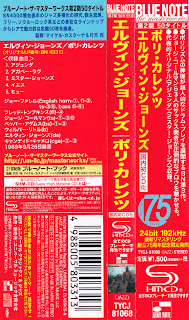
Pairing Dizzy Gillespie with Cuban arranger/composer Chico O'Farrill produced a stunning session which originally made up the first half of a Norgran LP. O'Farrill conducts an expanded orchestra which combines a jazz band with a Latin rhythm section; among the participants in the four-part "Manteca Suite" are trumpeters Quincy Jones and Ernie Royal, trombonist J.J. Johnson, tenor saxophonists Hank Mobley and Lucky Thompson, and conga player Mongo Santamaria. "Manteca," written during the previous decade, serves as an exciting opening movement, while the next two segments build upon this famous theme, though they are jointly credited to O'Farrill as well. "Rhumba-Finale" is straight-ahead jazz with some delicious solo work by Gillespie. A later small-group session features the trumpeter with an all-Latin rhythm section and flutist Gilberto Valdes, who is heard on "A Night in Tunisia" and "Caravan." Both of the Latin versions of these pieces are far more interesting than "Con Alma," as the excessive percussion and dull piano accompaniment add little to this normally captivating theme. Long out of print, this 2002 CD reissue will only be available until May 2005; it is well worth acquiring. Ken Dryden
Tracklist :
1 Manteca Theme 4:11
2 Contrastes 2:46
3 Jungla 4:44
 4 Rhumba-Finale 4:39
4 Rhumba-Finale 4:39
5 A Night In Tunisia 4:15
6 Con Alma 5:01
7 Caravan 7:20
Credits :
Alto Saxophone – George Dorsey (tracks: 1 to 4), Hilton Jefferson (tracks: 1 to 4)
Arranged By, Conductor – Chico O'Farrill (tracks: 1 to 4)
Baritone Saxophone – Danny Bank (tracks: 1 to 4)
Bass – Roberto Rodriguez, Lou Hackney (tracks: 1 to 4)
Bongos – José Manguel
Congas – Candido Camero, Mongo Santamaria (tracks: 1 to 4)
Drums – Charlie Persip (tracks: 1 to 4)
Flute – Gilberto Valdez (tracks: 5, 7)
Percussion – Rafael Miranda (tracks: 5 to 7)
Piano – Ray Concepcion (tracks: 1 to 4), Rene Hernandez (tracks: 5 to 7), Wade Legge (tracks: 1 to 4)
Tenor Saxophone – Hank Mobley (tracks: 1 to 4), Lucky Thompson (tracks: 1 to 4)
Timbales – Ubaldo Nieto
Trombone – George Matthews (tracks: 1 to 4), J.J. Johnson (tracks: 1 to 4), Leon Comegys (tracks: 1 to 4)
Trumpet – Dizzy Gillespie, Ernie Royal (tracks: 1 to 4), Jimmy Nottingham (tracks: 1 to 4), Quincy Jones (tracks: 1 to 4)
Notes
Tracks 1-4: Recorded May 24, 1954 at Fine Sound, New York City
Tracks 5-7: Recorded June 3, 1954 at Fine Sound, New York City
 Bennie Green, one of the few trombonists of the 1950s not to sound
somewhat like a J.J. Johnson clone, always had a likable and humorous
style. He blends in well with tenor saxophonist Charlie Rouse on these
standards, blues, and jump tunes, two of which have group vocals. With a
fine rhythm section (pianist Cliff Smalls, bassist Paul Chambers,
drummer Osie Johnson, and Candido on congas), Green and his band show
that there is no reason that swinging jazz has to be viewed as overly
intellectual and esoteric. This CD (a reissue of the original LP) is a
fine example of Bennie Green's talents and winning musical personality. Scott Yanow
Bennie Green, one of the few trombonists of the 1950s not to sound
somewhat like a J.J. Johnson clone, always had a likable and humorous
style. He blends in well with tenor saxophonist Charlie Rouse on these
standards, blues, and jump tunes, two of which have group vocals. With a
fine rhythm section (pianist Cliff Smalls, bassist Paul Chambers,
drummer Osie Johnson, and Candido on congas), Green and his band show
that there is no reason that swinging jazz has to be viewed as overly
intellectual and esoteric. This CD (a reissue of the original LP) is a
fine example of Bennie Green's talents and winning musical personality. Scott Yanow.jpg)

































.jpg)
.jpg)



